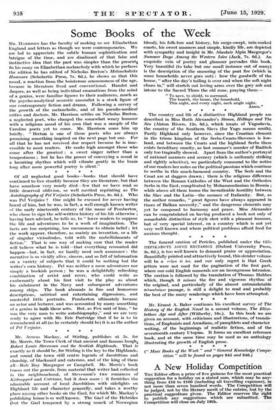Some Books of the Week
Ma. HARRISON has the faculty of making us see Elizabethan England and letters as though we were contemporaries. We are led to appreciate the subtle human sophistication and intrigue of the time, and are disabused of that false and instinctive idea that the past was simpler than the present, In his essay on Elizabethan melancholy with which he prefaces the edition he has edited of Nicholas Breton's Melancholicke Humours (Scholartis Press, 7s. 6d.), he shows us that this mood, a reaction from the boisterous sensuousness-of the age, became in literature fixed and conventional. Hamlet and Jaques, as well as being individual emanations from the mind of a genius, were familiar figures to their audiences, much as the psycho-analytical neurotic amoralist is a stock figure of our contemporary fiction and drama. Following a survey of the growth of the melancholic, and of his pseudo-medical critics and doctors, Mr. Harrison settles on Nicholas Breton, a neglected poet, who charged the somewhat weary humour with a religious mood of his own that was a sample of the Caroline poets yet to come. Mr. Harrison sums him up briefly. " Breton is one of those poets who are always promising something inspired on the next page but one. For all that he has not received due respect because he is inac- cessible to most readers. He ranks high amongst those who come after the greatest ; a sweet singer rather than a tempestuous ; but he has the power of conveying a mood in a haunting rhythm which will vibrate gently in the brain long after more powerful poetry• is silent."
* * * *






































 Previous page
Previous page